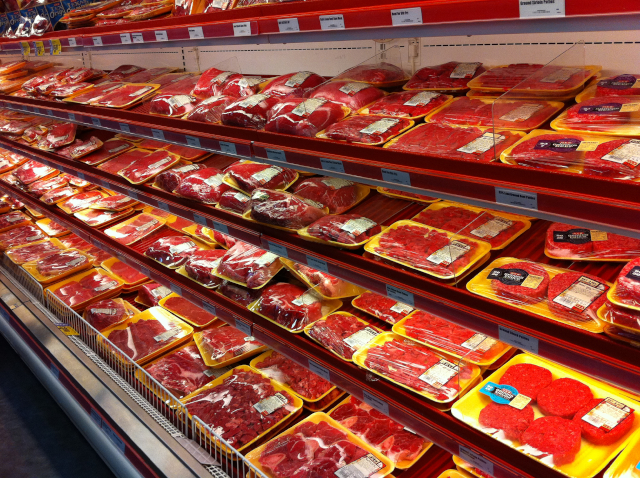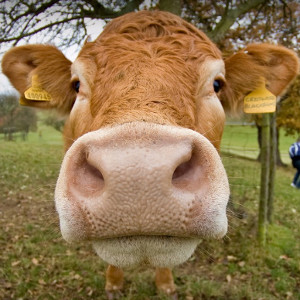The British Government – one of the most progressive in the Western World when it comes to calling out dietary and climate change issues – is considering a new strategy to increase food sustainability by cutting meat consumption by 30 percent over the next decade…
 Scenes like this one, in a typical supermarket meat department, may become rare,
Scenes like this one, in a typical supermarket meat department, may become rare,
or disappear altogether, as we convert our diets from meat to plant protein…
The ultimate goal, the strategy and other studies recommend, is for European and North American societies to cut meat consumption by a total of 80 percent to create a sustainable, climate-healthy and human-healthy food system.
How important is it?
The strategy points out that, “Our current appetite for meat is unsustainable. Eighty-five percent of British farmland is used to feed livestock [and] we need some of that land back.”
That 85 percent ‘investment’ provides only 32 percent of the calories in the British diet. Meanwhile, the 15 percent of arable land used to grow plant-based foods provides a whopping 68 percent of the diet’s calories. The strategy calls for an immediate push to reduce meat consumption by at least 30 percent.
Other studies have been even less optimistic about the future of real meat. One recommends a the reduction of 80 percent in meat consumption and yet another calls specifically for a reduction in beef consumption of 90 percent to ensure a healthy future. And the same goes for dairy products.
Aside from the environmental benefits, a significant cut in meat consumption would also save billions of dollars a year in health care costs. Surveys have revealed that Brits on average eat 50 percent more beef than official dietary health guidelines recommend.
Wheels already in motion
One of the measures all the studies and reports on sustainability agree on is increasing massively our consumption of plant-based and cell-cultured foods.
To this end, caterers who serve billions of meals every year in schools, nursing homes and hospitals have already pledged to cut the meat in their menus by 20 percent.
“It represents a bold move, because it is not being mandated,” says David Foad, Editor-in-chief of Public Sector Catering. “It would have been much easier to sit back and wait until they were either prompted or forced into action like this by government.”
Foad points out that the 20 percent goal would reduce British meat consumption by 9 million kg / 19.8 million lb. per year – the equivalent of 45,000 cows or 16 million chickens.
Taxes proposed
‘Meat taxes’ have also been proposed as a means of discouraging consumers from eating meat. A report by the TAPP Coalition for the European Union predicts that a tax of 25 percent on red meat would reduce beef consumption by up to 67 percent by 2030. Pork consumption would be cut by 57 percent and chicken by 3o percent.
TAPP suggests the tax be called a ‘sustainability charge’, since the word ‘tax’ has collected so much negative emotional and political baggage over the years.
Proceeds from the tax would be used to help farmers convert from meat raising to plant production, support the development and scale up production of plant-based foods, and reduce the cost of such foods, which are now higher, in most cases, than those of real meat.
My take
One aspect of the proposed reduction in meat consumption that is not given high-profile exposure in all the reports and recommendations is that the resulting increased production and consumption of plant products should focus on protein-rich plants. We already grow plenty of starchy carbs – wheat, corn and rice. We have to concentrate on boosting production of plant protein sources to fill the void left by the reduction in meat.
I also wonder how successful the proposed ‘sustainability charge’ would be, given that the cost of meat – beef in particular – is already very high compared to what many older consumers are used to, and many have already reduced their red meat consumption as a result. I presume that the recommended 80 percent reduction would be on top of that. Is there that much room for further reduction by 2030? Or will it take longer for the population balance to shift to folks who are now younger, but have grown up with dietary habits and preferences less focused on red meat?
But my reflections on this issue are not all pessimistic. I like the idea that proceeds from the proposed meat taxes would go to support the further development of plant-based protein products, and help farmers make the switch from meat to plant growing. Too often, I’ve noted, proposals to reduce greenhouse gas production and other climatic impacts by reducing meat raising often disregard the need to protect the farmers and ranchers from ruin in the process.
~ Maggie J.

